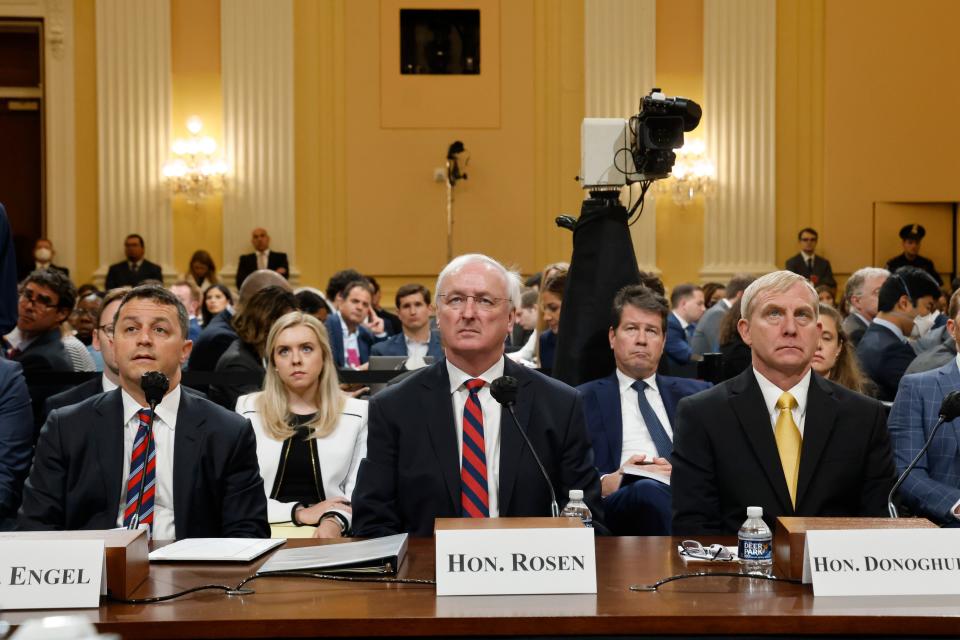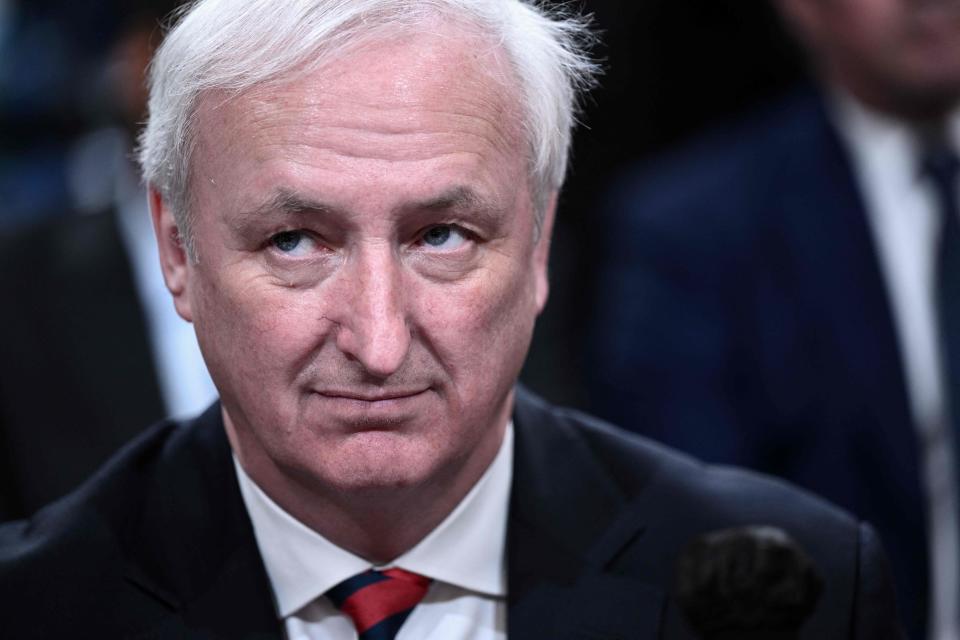Miss Day 5 of the Jan. 6 hearing? Trump's plan to topple the Justice Department and more
- Oops!Something went wrong.Please try again later.
The special congressional committee investigating the Jan. 6 Capitol riots focused its fifth day of public testimony on former President Donald Trump's attempts to manipulate the Department of Justice after federal investigators found no evidence of election fraud.
Three ex-officials, including former acting Attorney General Jeffrey Rosen, testified during Thursday's hearing about a tense confrontation at the White House weeks after the Nov. 3, 2020 presidential election.
Rep. Bennie Thompson, D-Miss, chair of the committee, said Trump "didn't just want the Justice Department to investigate, he wanted the Justice Department to help legitimize his lies."

Witnesses said Trump grew agitated when DOJ failed to find any merit to his baseless claims about election fraud, and sought to replace Rosen with Assistant Attorney General Jeffrey Clark.
The committee displayed a draft letter written by Clark addressed to Georgia legislative leaders, which falsely alluded to possible voter fraud in key states even after investigators found no evidence.
"Had this letter been released on official Department of Justice letterhead, it would have falsely informed all Americans – including those who might be inclined to come to Washington on Jan. 6 – that President Trump's election fraud allegations were likely very real," said Rep. Liz Cheney, R-Wyo., the committee's vice-chair.
The only thing that thwarted Trump's scheme, according to Thursday's witnesses, was the threat of a mass resignation by top lawyers in the Justice Department and the White House counsel's office.
Here are the highlights from Day 5 of the hearing:
Trump: 'Leave the rest to me'
Rep. Adam Kinzinger, R-Ill., said at the outset of Thursday's hearing that pressuring federal officials was part of a "last ditch scheme" by Trump to keep Congress from certifying President Joe Biden as the winner of the 2020 election.
Kinzinger said the former president wanted DOJ to lend "credibility to the conspiracies" by declaring the election "corrupt" and said they should "leave the rest to me and the Republican congressmen."
Clark wanted to help Trump, aides say
Former Trump White House lawyer Eric Herschmann, in video testimony, said Clark was the one who proposed telling six swing states they should send alternate electors to Congress to support Trump.
Other Trump aides described how Clark wanted to be attorney general for the sole purpose of helping Trump overthrow the election results. One described his draft letter backing up false claims about the 20202 election as a "murder-suicide pact."
Rosen testifies how DOJ resisted
During in-person questioning Thursday, Rosen described how Trump decried daily in the days leading up to Jan. 6 his frustration with the Justice Department for not backing his claims of voter fraud.
Among other things, he said, the former president wanted the agency appoint a special counsel, meet with his re-election campaign lawyers and file a lawsuit with the U.S. Supreme Court.
"The Justice Department declined all of those requests... because we did not think that they were appropriate based on the facts and the law as we understood them,” Rosen said.

Unauthorized meeting with Trump
Clark also broke DOJ rules, Rosen said, by having a one-on-one meeting with Trump just before Christmas.
"You didn’t tell me about it, it wasn’t authorized, and you didn’t even tell me after the fact," Rosen told Clark on Dec. 26., according to his testimony. "This is not appropriate."
'Arsenal of allegations' for hours
Former Acting Deputy Attorney General Richard Donoghue told the committee that Trump spent hours with DOJ officials in January lobbing an "arsenal of allegations" of election fraud that he wanted addressed.
Donoghue said Thursday he evaluated the details of each claim that Trump brought up, and was "very blunt" about how baseless they were. There were "isolated incidents of fraud," he said, but none close enough to "calling into question the outcome of the election in any individual state."
Jan. 6 committee evidence: Is the Jan. 6 committee sitting on explosive evidence of Trump's role in the Capitol assault?
House GOP members played a role
One new wrinkle in Thursday's hearing was Kinzinger naming fellow Republican members of Congress and alleging that they tried to help Trump overturn the election.
The special committee played clips of GOP lawmakers who repeated false claims about the contest, including Rep. Louie Gohmert, of Texas, who alleged there was "widespread evidence of fraud."
It also showed text messages from Rep. Scott Perry, R-Pa., to Trump administration officials, namely chief of staff Mark Meadow, lobbying the White House to elevate Clark within DOJ.
Congressman's claims about Pennsylvania were debunked
Perry also had a conversation with Donoghue claiming more votes had been certified by the Pennsylvania secretary of state than had been cast.
Donoghue told the committee that federal prosecutors looked into those claims, and found "no foundation for concern" within days. The number of votes cast was incomplete because four counties had not yet uploaded their voter data, he said.

Clark launched his own probe
Donoghue said he had a "very contentious meeting" with Clark about his draft letter backing up Trump's false claims, saying it was "not based on fact."
He said it was shocking to learn Clark had started his own investigation even after federal authorities had determined they were unfounded.
The committee then showed taped testimony of Clark evoking his 5th Amendment rights when asked about the draft letters to Georgia officials to overturn the certified election.
Trump wanted voting machines seized
Rosen said Trump called a last-minute meeting DOJ leaders on New Year’s Eve. The president, he said, was upset when he declined to seize voting machines from states.
“We had seen nothing improper in regards to the voting machines,” Rosen said.
The Italian job?
An Italian conspiracy theory engulfed the White House, witnesses said.
Mark Meadows, Trump's chief of staff, wanted DOJ to investigate a video alleging that an Italian defense contractor uploaded software into the foreign government's satellites that changed votes to Biden in the U.S., which officials had quickly debunked.
Trump embraced the idea, which was also pushed by Rep. Scott Perry, of Pennsylvania, according to the committee.
Donoghue called it "pure insanity."
New DOJ leadership sought
It was around this time when Trump started to float the idea of firing top DOJ leaders.
Donoghue said he told the president that replacing them wouldn't change the outcome of their investigations or the 2020 election.
"The United States’ Justice Department functions on facts, evidence and law, and those are not going to change," he said. "So, you can have whatever leadership you want, but the department's position is not going to change."
Politics: Jan. 6 committee members are receiving rising threats of violence, GOP Rep. Adam Kinzinger says
More: Rep. says Trump pressured election officials
Clark offered AG job
Rosen said that during a Jan. 2 meeting, Clark informed him that the president had offered him the job as acting attorney general and he would accept.
He said he rebuked Clark for being insubordinate.
"I wasn't going to accept being fired by my subordinate, so I wanted to talk to the president directly," Rosen said.
Mass resignations threatened
If Clark was appointed, each of the witnesses told the committee, hundreds of lawyers in DOJ and the White House counsel's office would leave their jobs.
They described a heated conversation with Trump, who asked "what do I have to lose?"
Steven Engel, who was the assistant attorney general for the office of legal counsel, said he warned the president that the story would be, "the disaster of Jeff Clark" and that he would be left "leading a graveyard."
Pardons sought
At the conclusion of Thursday's hearing the committee played testimony from former White House and Trump campaign aides who said certain GOP lawmakers – such as Rep. Matt Gaetz, of Florida and Andy Biggs, of Arizona – asked for presidential pardons in the days after the Jan. 6 attacks.
In a Jan. 11 email shown by the committee, Rep. Mo Brooks, of Alabama, recommended a pardon for "every congressman and senator who voted to reject the Electoral College vote submissions of Arizona and Pennsylvania."
Trump considered a "blanket pardon" for all involved in Jan. 6., according to former aides.
This article originally appeared on USA TODAY: Miss Day 5 of the Jan. 6 hearing? Plan to topple Justice Department

